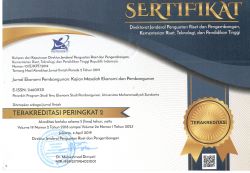Impact of Exchange Rate Volatility to Stocks’ Return in Indonesia: The Augmented Markov-Switching Egarch Approach
Wasiaturrahma Wasiaturrahma(1), Dita Normalaksana Putri(2), Shochrul Rohmatul Ajija(3*)(1) Universitas Airlangga
(2) Universitas Airlangga
(3) Universitas Airlangga
(*) Corresponding Author
Abstract
The stock price is one indicator that represents the economic performance in a country. Changes in stock prices, including various factors, as an example, is the exchange rate changes as the representation from the foreign exchange market. The fluctuating exchange rate price also influences the volatility of the stock price. Furthermore, volatility has different high and low regime stages that will cause a disparate impact on the outcome of the relationship changes. This study aims to examine the presence of asymmetric volatility and its effects on the volatility of LQ45 stock returns, as well as the changes in exchange rates of Rupiah against USD from 1997 to 2017. Using the Augmented Markov Switching EGARCH approach, the results of this study indicate an asymmetric behavior in the volatility of LQ45 stock returns. High volatility regimes are more dependent and more unstable than low volatility regimes, and low volatility regimes dominate the duration compared to the high volatility regime. The good and bad news give different impact on LQ45 stock return volatility and exchange rate changes. Moreover, the unstable economies will respond faster than the stable economies in terms of facing the exchange rate changes.
Keywords
Full Text:
PDFArticle Metrics
Abstract view(s): 642 time(s)PDF: 583 time(s)
Refbacks
- There are currently no refbacks.















